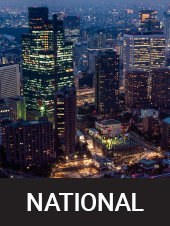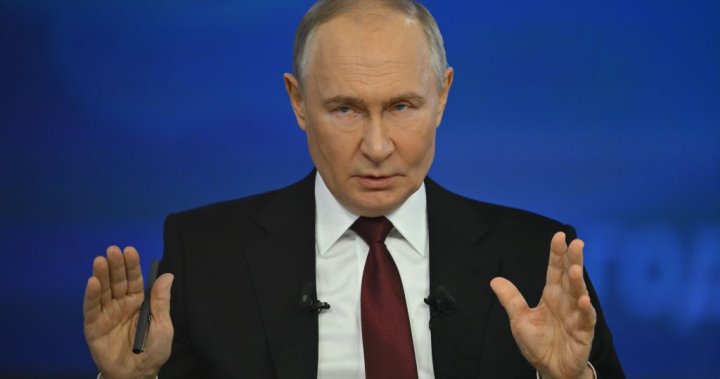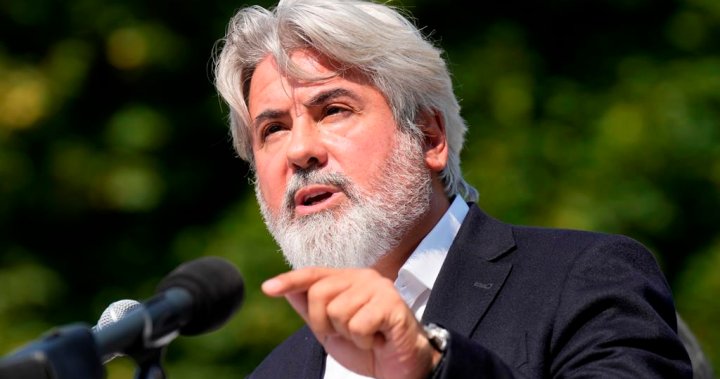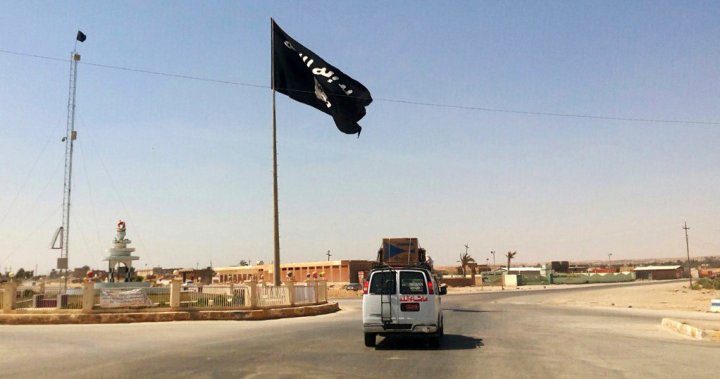President Vladimir Putin boasted that his military operation in Ukraine has strengthened Russia and denied that the ouster of key ally Bashar Assad in Syria had hurt Moscow’s prestige, as he held his annual news conference and call-in show Thursday.
He used the tightly choreographed event, which lasted over four hours, to reinforce his authority and demonstrate a sweeping command of everything from consumer prices to military hardware.
He claimed that sending troops into Ukraine in 2022 has boosted Russia’s military and economic power.
“Russia has become much stronger over the past two or three years because it has become a truly sovereign country,” he said. “We are standing firm in terms of economy, we are strengthening our defense potential and our military capability now is the strongest in the world.”

Putin, who has held power for nearly a quarter-century and was reelected to another six-year term in February, said the military was “advancing toward achieving our goals” in what he calls the special military operation in Ukraine.
In response to a question about a new hypersonic ballistic missile that Russia used for the first time last month to strike Ukraine, Putin scoffed at claims by some Western experts that it could be intercepted by NATO’s air defences.
He mockingly challenged Ukraine’s allies to a “high-tech duel,” suggesting that Moscow could give advance notice of a strike on Kyiv with the Oreshnik missile and see if the West could protect the city.
“Let them select a target, possibly in Kyiv, put their air defence assets there and we shall strike it with the Oreshnik,” he said with a dry smile. “Let’s see what happens.”
Russia is making steady, if slow, advances in Ukraine, but has also suffered embarrassing setbacks. On Tuesday, Lt. Gen Igor Kirillov was killed by a bomb planted outside his apartment building in Moscow — a brazen assassination claimed by Ukraine that brought the conflict once again to the streets of the Russian capital.

Get daily National news
Get the day’s top news, political, economic, and current affairs headlines, delivered to your inbox once a day.
Putin described Kirillov’s killing as a “major blunder” of Russia’s security agencies, noting they should learn from it and improve their efficiency.
Moscow’s troops are also battling Ukrainian forces in the Russian region of Kursk, where they have launched an incursion. Asked when they would drive the Ukrainians out, Putin said “we will certainly kick them out” but wouldn’t say how long it would take.
The show, which is broadcast live by state-controlled TV across Russia’s 11 time zones, usually is dominated by domestic issues, with journalists and ordinary people calling in to ask about soaring consumer prices and mortgages, paltry pensions and shortage of doctors. But the Russian leader is particularly watched for his answers on foreign affairs.
In a flourish typical of the marathon news conferences, he asked members of the audience to unfurl a banner presented to him by marines fighting in Kursk as he spoke about Ukraine.
Putin said he was open to possible talks with U.S. President-elect Donald Trump, who has pledged to negotiate a deal to end the conflict in Ukraine.
“If we meet with Mr. Trump, we will have things to discuss,” he said, without elaborating.
Putin said Russia is open for compromise in potential peace talks on Ukraine.
“Politics is the art of compromise,” he said. “We have always said that we are ready for both talks and compromises.” At the same time, Putin added that the talks should be based on “the situation on the ground” referring to some of the conditions he previously laid out.
Putin has previously demanded that Ukraine renounce its bid to join NATO and recognize Russia’s gains. Kyiv and the West have rejected those demands.
In his first comments on Assad’s downfall, Putin said that he hadn’t yet met the former Syrian ruler, whom he has given asylum in Moscow, but plans to. He said will ask him about Austin Tice, an American journalist who went missing in Syria 12 years ago.
“We also can pose the question to people who control the situation on the ground in Syria,” Putin said, in response to a question from NBC’s Keir Simmons, who cited a letter he said Tice’s mother wrote to the Russian leader seeking assistance.
Moscow has sought to establish contacts with the rebels who ousted Assad to secure its diplomatic and military personnel in the country and try to extend the lease on its air and naval bases in the country.

But it’s unclear how much influence Russia will have in Syria. Assad’s fall has dealt it a painful blow since Russia has fought for nine years to prop him up in the country’s civil war.
Still, Putin denied the events had weakened Moscow, arguing that it has achieved the goal of destroying “terrorist” groups in Syria via an air campaign launched in support of Assad in 2015. He claimed that rebel groups that were fighting against Assad have changed and the West is now ready to establish ties with them.
“That means that our goals have been achieved,” Putin said.
He described Israel as the “main beneficiary” of Assad’s downfall, noting the deployment of Israeli troops in southern Syria. He voiced hope that Israel will eventually withdraw those forces but noted it is still building them up.
He said Moscow will talk to the new authorities in Syria about possibly extending the presence of Russian bases in the country.
“If we stay there, we will need to do something in the interests of the host country,” he said, adding that Moscow offered to use its Hemeimeen air base and a naval base in Tartus for humanitarian aid deliveries. “What those interests could be, what could we do for them is an issue to be thoroughly examined by both parties.”
He noted the Syrian army offered little resistance to the opposition offensive and said Russia flew 4,000 Iranian troops from its Hemeimeem air base to Tehran.
Putin began the session by saying that Russia’s economy is on track to grow by nearly 4 per cent this year. He acknowledged that consumer prices are high, with inflation at 9.3 per cent, but insisted that the economic situation remains “stable.”
Putin dodged a question about abortion and pornography in Russia, as well as burying the body of Soviet Union founder Vladmir Lenin, which has been displayed in a mausoleum on Red Square for nearly a century.
The annual show is as much spectacle as news conference. Journalists in the hall near the Kremlin wave colourful signs and placards to attract Putin’s attention.
Russian state media reported that ordinary citizens submitted more than 2 million questions ahead of the show.






